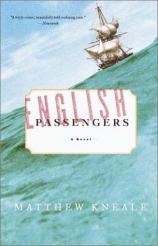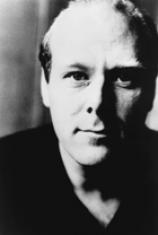Reading Group Guide
Discussion Questions
English Passengers

1. More than twenty different points of view are presented in English Passengers. What does the author achieve by using this complex structure? What do the official reports and the observations of a variety of minor characters add to the stories told by Peevay, Captain Kewley, Dr. Potter, Renshaw, and Reverend Wilson?
2. English Passengers is in many ways an old-fashioned adventure story. What conventions does it share with classic tales of sea voyages you have read? How does it subvert or mock the tradition? In what ways does Captain Kewley fit the conventional definition of a "hero"?
3. Which members of the expedition provide the most credible versions of the events? Is Renshaw a completely objective observer of the rivalry between Potter and Wilson? What prejudices color Kewley's descriptions of both the passengers and their missions?
4. How do the personal histories of the characters illuminate specific historical realities? For example, why did the author choose a half-aboriginal, half-white man to recount the story of the destruction of Tasmania's native culture? In what ways does the fact that the captain and crew of the Sincerity are Manxmen, with their own language and culture, enhance the themes the novel explores?
5. In an introductory note describing Peevay's narration, Kneale writes, "My intention was to portray someone intelligent and interested in words, who is from a culture wholly remote from that of white men but has been educated by them" [p. x]. How do Peevay's language and his descriptions of events convey this mixture of two cultures? What particular elements capture pre-literate Tasmanian traditions and culture?
6. The conflicts between Wilson and Potter bring to life the fight between the creationists and evolutionists that erupted during the nineteenth century. (Darwin's Journal of Researches into the Natural History and Geology of the Countries Visited During the Voyage of the H.M.S. Beagle Round the World, Under the Command of Capt. Fitz Roy, R.N. was published in1839; his The Origin of Species appeared in 1859, two years after the fictional voyage in English Passengers). Wilson's "Theory of Divine Refrigeration" and his belief that the Garden of Eden can be found in Tasmania are obvious and hilarious parodies of nineteenth century attempts to use geology to prove the literal truth of the Bible. Is Potter's investigation into the races of mankind a more rational, more "scientific" undertaking? How does the presentation of each man's theories affect your reaction to them?
7. Are Dr. Potter and Reverend Wilson believable characters? What devices does the author use to make them individuals rather than stereotypes of the evil scientist and the irrational religious fanatic? What aspects of their personalities are admirable? Do your opinions of them change during the course of the novel?
8. When Peevay learns the truth about his parents, he says, "I saw others watching me, and their looks were as if I was different now, not quite like them, which was heinous" [p. 57]. Is the reaction of the tribe understandable? What effect does this incident have on Peevay's behavior? What strengths does his position as an outsider give him? Is it unusual for a child be ostracized because of his heritage? What other examples in real life or in literature can you give of a misfit forced to make his or her own way in the world?
9. Peevay's mother assumes leadership of the tribe when she returns [p. 90]. From what source does she derive her power? Is her hatred for Peevay's father the only thing that drives her? Why is her relationship with his half-brother, Tayaleah, so disturbing to Peevay?
10. What do the letters between the Governor of Van Dieman's Land and the Secretary the Colonies [pp. 96Ð99] reveal about English perceptions of their role in the world? How and why do their positions on the treatment of the native population differ? Is one man more "moral" than the other?
11. What parallels can be drawn between the establishment of penal colonies in Australia and Tasmania and the attempts to "civilize" the local populations? Do the social and political ideas embodied in the penal system influence how the convicts and other settlers treat the local population? Is there a connection, for example, between official attitudes and the abuse inflicted on the Tasmanian population?
12. Why is Robson able to persuade the Tasmanians to follow him? Why do his manner and approach convince Peevay "that maybe this white man could save us like he said" [p. 147]? Does Robson deliberately deceive Peevay and the other Aborigines? How would you characterize his attitude toward them? Is it sympathetic? Patronizing? Naïve?
13. What does Katherine Price's portrait of Robson [pp. 230-246] reveal about his character and his motivations? How does it belie her intention to defend him?
14. Explaining why he attends the English school and church, Peevay says, "I want to know them so I can fight them" [p. 227]. His mother, Walyeric, warns him, "It's better just to kill them. . . . Know them too much and you may get like them" [p. 227]. What does the visit from the governor [pp. 253-259] show about the validity of these different approaches? How do they relate to Tayaleah's death? What does Peevay mean when he says, "I saw Tayaleah was like some fellow who is snared between his awake and his dreamings, and is pulled by both" [p. 265]?
15. Pagerly says Peevay and Walyeric are "like two rocks stuck in mud that you cannot push together, and when you try they get stuck deeper" [p. 300]. Are Peevay and his mother equally responsible for their estrangement? What characteristics do they share that make it impossible for them to reconcile?
16. Why is the theft of his mother's body the important turning point for Peevay? Why does it so profoundly affect his attitudes about whites? Do you think he is right when he says, "White men never would help some black-fellow. . . . They never did before and they never would" [p. 334]? What historical or current day situations support his feelings? Can you think of examples that contradict it?
17. The expedition into the Tasmanian wilds is part farce and part dramatic, frightening adventure story. How does Kneale achieve this delicate balance? Beyond the physical difficulties and tragedies, what factors contribute to Wilson's mental breakdown?
18. How does the mutiny of the Sincerity bring together the various threads of the novel? What do Potter's writings--and the rules he imposes [pp. 400-401]--indicate about his state of mind? Are the reactions of Kewley and the crew different from their responses to the misfortunes they have faced since the beginning of the novel? Has the voyage changed Kewley in any way?
19. Are the climax of the voyage and the fates of the individuals aboard satisfying? What is the significance of Kewley's visit to the exhibit of Tasmanian artifacts?
20. Shortly after the expedition, Peevay meets a group of people who are also part Aborigine and part white, an event he describes as "great good fortune and tidings of joy, better than any I ever had before" [p. 433]. Although Peevay hopes that one day he and his new family can avenge the past, the author leaves their future uncertain. Why do you think Peevay's story ends on this ambiguous note?
21. In the Epilogue, Kneale describes the real events and people behind the novel and writes, "All fiction--and nonfiction--changes and concentrates what it portrays" [p. 439]. Discuss how this applies to English Passengers, as well as to other historical novels or histories you have read.
22. English Passengers focuses on the evils of colonialism and particularly on the racism that "legitimized" it. Kneale cites several examples of insidious racial theories that started in the 1850s and continued to flourish in the twentieth century [p. 440]. What other figures or writings perpetuate this legacy? In what ways do they echo Potter's pseudo-science and Wilson's insistence on the literal truth of the Bible?
English Passengers
- Publication Date: January 16, 2001
- Genres: Fiction, Historical Fiction
- Paperback: 464 pages
- Publisher: Anchor
- ISBN-10: 038549744X
- ISBN-13: 9780385497442








